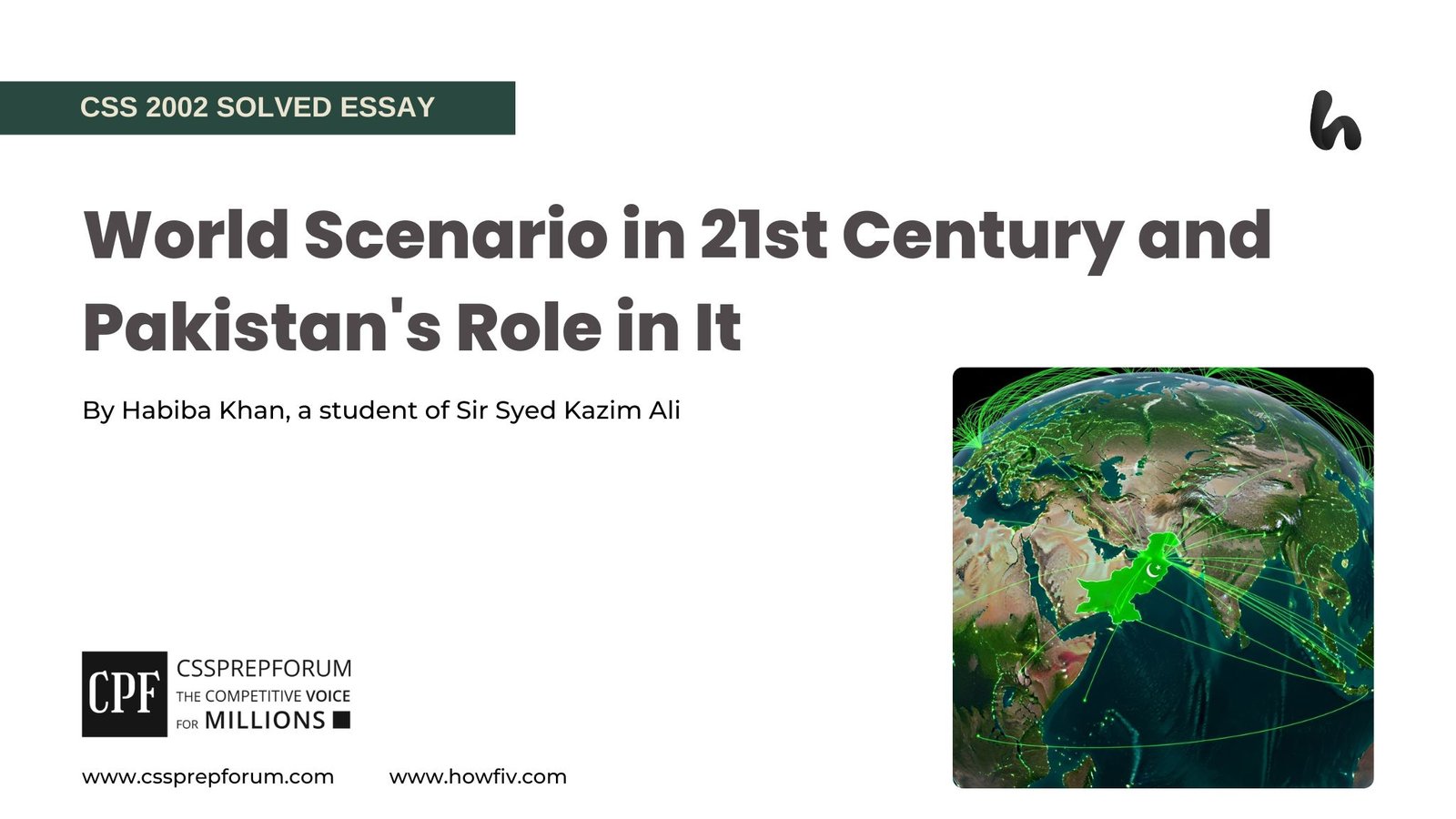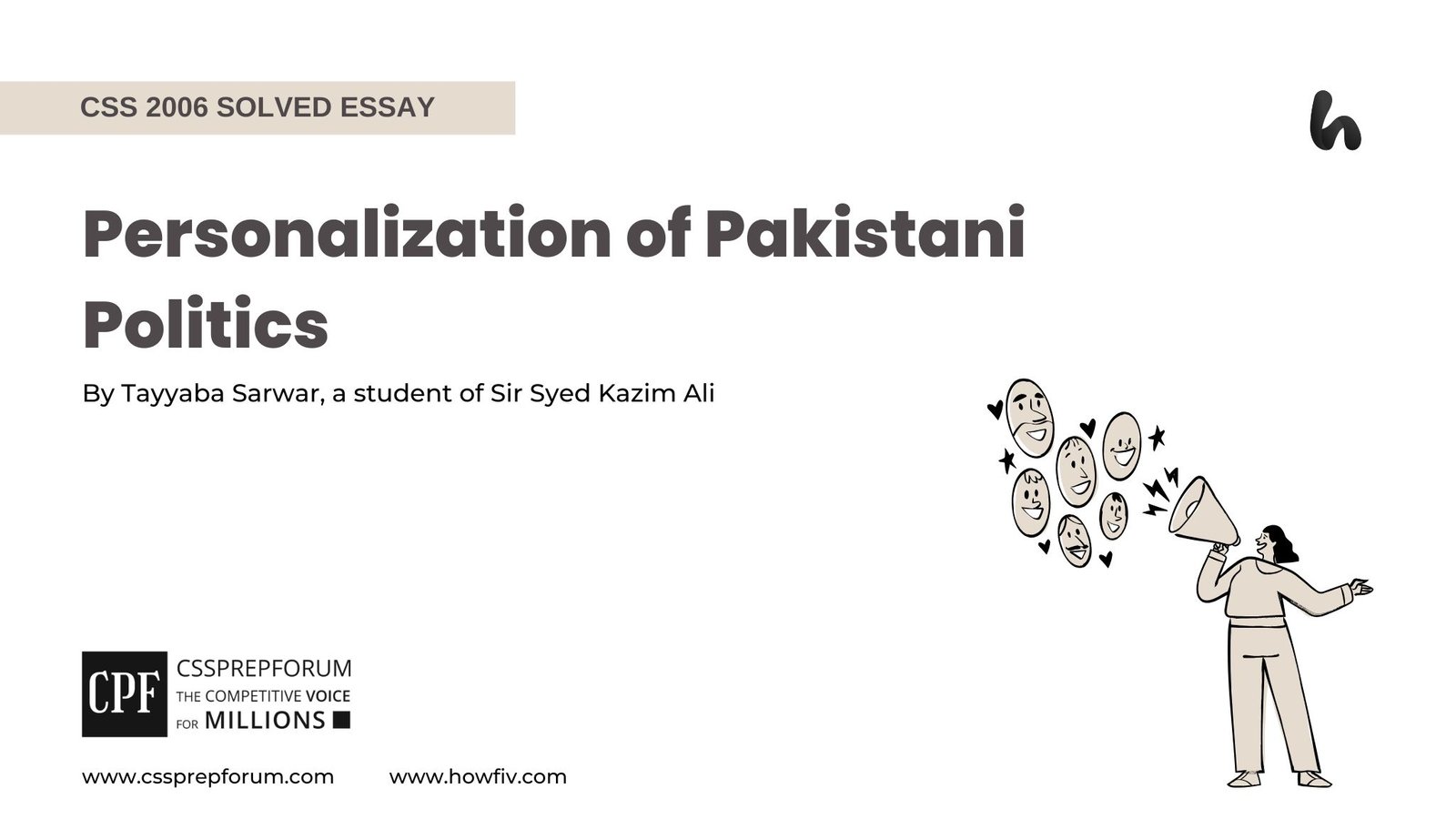CSS 2024 Solved Pakistan Affairs Past Papers | Hindrances on the Way of Democratic System in Pakistan
The following question of CSS Pakistan Affairs 2024 is solved by Miss Iqra Ali, Pakistan’s Best Pakistan Affairs Coach, on the guided pattern of Sir Syed Kazim Ali, which he taught to his students, scoring the highest marks in compulsory subjects for years. This solved past paper question is uploaded to help aspirants understand how to crack a topic or question, how to write relevantly, what coherence is, and how to include and connect ideas, opinions, and suggestions to score the maximum.

Question Breakdown
In this question, the examiner has asked you one leading thing about your opinion, whether you consider dynastic politics and feudalism to be the major hindrances on the way of establishing a true democratic system in Pakistan. So, first, you need to briefly introduce the things that are going to be a part of your answer with historical background about the development of democracy in Pakistan and why the process remains ambiguous and weak. Then, write your answers by splitting them into parts as the question demands. Finally, end your answer with a critical analysis and conclusion. The following solved question provides a comprehensive answer covering all the main aspects. However, as far as the answer in the paper is concerned, limit yourself to 3 or 4 leading arguments against each part of the question.
Outline
1- Introduction
2- Historical Background of Major Hindrances on the Way of Establishing True Democratic System in Pakistan
3- How Dynastic Politics and Feudalism are the Major Hindrances on the Way of Establishing a True Democratic System in Pakistan?
3.1- Dynastic politics hinders the evolution of the democratic system
- ✓By Inhibiting the Process of Political Institutionalization
- ✓By Negating the Principle of Intra-Party Democracy
- ✓By Creating the Imbalance of Power, Authoritarian Tendencies, Patronage Based Political System
3.2- Feudalism hinders the evolution of the democratic system
- ✓By Inhibiting Coalescence between the Political Parties
- ✓By Sowing the Seeds for Intra-Party Conflict, Factionalism, and Rapid Succession of Formation of the Political Parties
- ✓By Making Frequent Dismissal of the Elected Governments before Completing their Mandates
4- How to Tackle the Persistent Issues to establish the true Democratic System in Pakistan?
- ✓By Reforming the Political Dynamics, Check on the Arbitrary Powers of Elected Leaders
- ✓By Encouraging a Bottom-Up Approach to Access Political Offices to Talented Individuals without Any Feudal or Dynastic Affiliations
- ✓By Promoting Intra-Party Democracy
- ✓By Electoral Reforms where Voters would be Able to Link Parties with the Actual Service Delivery Outcomes
5- Critical Analysis
6- Conclusion

Answer to the Question
Introduction
In Pakistan, a weak and ambiguous democratic system has led to the dismal state of its polity; however, immature, non-institutionalized, authoritative political dynamics marred its development. At Present, the country has been working under the governance model of Parliamentary Democracy. Historically, the Constitution of 1973 has provided the basis for it. Generally, political parties are the basis of parliamentary democracy. Unfortunately, the political parties have failed to achieve the goal of democratic governance. However, there are myriad reasons behind this. First, the hegemony of particular families in the political governance proved a malaise for the whole political order that has destabilized the polity to the depth of its roots. Second, the domination of feudal ethos that pervaded the politicians further destabilized the political dynamics in an unprecedented way, which inhibited the process of democracy. In a democratic country, a stabilized polity is a reiteration of its uninterrupted development and strength. Unfortunately, the state fell behind in achieving the goal of sustained political stability. According to Ishrat Hussain as he aptly said in his book ‘Governing the Ungovernable,’ the political institutions haven’t achieved that level of maturity that can contribute to improved democratic governance. As a result, its democratic system is still weak and underdeveloped. In a nutshell, several constitutional and political remedies may prove beneficial in abating the persistent issues of dismal democratic governance. The electoral reforms can significantly contribute by mitigating intra-party conflicts, factionalism, and partisan politics. To conclude, it is high time to adopt a pragmatic approach toward finding a solution to the political feuds and authoritarian tendencies of feudal and family-based hegemons for the sustainable development of democracy.
Historical Background of Major Hindrances on the Way of Establishing a True Democratic System in Pakistan
Pakistan has adopted a democratic form of government since its independence. However, all the constitutions of 1956, 1963, and 1971 have retained this feature of governance. Now, the country is working under a democratic form of government with a president as head of the state and the prime minister as head of the government. The decentralization of power divides the political power among three tiers of government, namely the centre, provinces, and local bodies. Unfortunately, the county’s experience with democracy remained tumultuous. During the early period 1947-1958, the six civilian governments remained unable to form a coalition. In seventy-seven years, the country has governed under twenty-three prime ministers, but no one completed his tenure of premiership. Furthermore, four subsequent martial laws from 1958-1969, 1969-1971, 1977-1988, and 1999-2006 have rocked the ship of democracy. The country’s polity remained highly unstable, with a fragile economy and weak state institutions. All these factors contributed to bureaucratic doldrums. Hence, the democratic process has not evolved completely and remained ambiguous and weak.

How Dynastic Politics and Feudalism are the Major Hindrances on the Way of Establishing a True Democratic System in Pakistan?
In Pakistan, dynastic politics and feudalism are the key drivers of the political instability that inhibit the process of sustainable democratic governance. The dynastic parties have created a patronage-based system to strengthen their network. According to Hassan Askari as he aptly said in his book The Military and Politics in Pakistan 1947-97, the Pakistan Muslim League-Noon (PML-N) created a patrimonial and patronage-based political order, where bureaucracy and the police are under their firm control and are loyal to the ‘House of Shariff’ in any way. As a result, the political parties opted to forge alliances with the dynastic parties that eventually increased the prospects of their electoral wins. As a result, nepotism, corruption, erosion of the state authority, subversion of laws and rules, and dismal status of institutions are the possible outcomes, as in the case of Pakistan. However, democracy requires non-partisan civil servants, robust institutions, the rule of law, and constitutional checks.
- ✓By Inhibiting the Process of the Political Institutionalization
Dynastic politics inhibits the process of political institutionalization that is indispensable for democratic governance. According to Ali Cheema, Hassan Javed, and Farooq Naseer-professors of Economics at the LUMS, Hasan Javed- Assistant professor at Muhammad Ali Jinnah University, an analysis has shown that since 1985, two out of three electoral races contested in Punjab between dynastic and non-dynastic candidates won by the dynastic contenders. The reason for the weak organizational structure of the political parties is the vicious cycle of forging alliances with the dynastic families to win over the electable. Due to these alliances, the parties distanced their selves from building an effective party machinery around a dedicated party cadre. As a result, the dynastic parties remained successful in holding their dominance.
- ✓By Negating the Principle of Intra-Party Democracy
In a dynastic political system, the essence of true intra-party democracy seems to be mirage. According to Ishrat Hussain as he aptly said in his book ‘Governing the Ungovernable,’ the landowners, traders, and business owners formed successive dynastic families since 1985. Because they relied upon dynastic political links, the former provided strength and lowered the chances of non-dynastic political aspirants to enter into politics. However, the dynastic parties have always considered lowering the barriers for non-dynastic political aspirants directly proportional to increased costs for political organizations. The party members and the designations of the dynastic parties have remained purely based on their affiliations. Hence, there has been a lack of effective competition, meritocracy, and a transparent electoral that ensures the credible working on the principles of intra-party democracy.
- ✓By Creating the Imbalance of Power, Authoritarian Tendencies, Patronage Based Political System
Moving forward, this concentration of power in the hands of a few destabilized the balance of political power, where Punjab has gained the most control. Moreover, it gave way to the development of autocratic tendencies and patronage-based political systems, which are the actual impediments to the growth of democracy. According to Seema Mustafa, a renowned South Asian Journalist, the dynasty can bring a sensibility that does not allow independence of thought and action. However, it institutionalizes authoritarianism that lives off factionalism. The democratically elected regimes possessed stringent control; however, the political parties remained dominated by the few dynastic ones. In contrast, democracy nullifies authoritative designs and encourages a decentralized system with the freedom of expression.
- ✓By Inhibiting Coalescence between the Political Parties
Feudalism in Pakistan not only hinders the evolution of the democratic system but also poses an irreparable threat to its internal security. However, in a multi-ethnic-linguistic population, the internal security of a country is a prerequisite for the evolution of democracy. Generally, democracy encourages decentralization, where state organs and units receive significant power that can abused in internally unstable countries. According to Anwar Syed, who is a renowned professor, the feudalistic ethos that pervades politicians resulted in intolerance of rivals, the expectation of subservience to lower orders, and a propensity for violence, disregard of the law, lack of commitment to the public interest, and consequent readiness to both corrupted, and subservience to the dominating center of power.
- ✓By Sowing the Seeds for Intra-Party Conflict, Factionalism, and Rapid Succession of Formation of the Political Parties
Consequently, intolerance of rivals inhibits coalescence between the political parties. However, the admittance of shared national goals encourages political parties to make decisions that negate feuds. Unfortunately, feuds in the political parties have shattered the democratic political governance since partition. The factional politics is an expected outcome of the feudal networks that marred the democratic order in an unprecedented way.
Moving forward, the lack of co-option between political politics has sowed the seeds of inter-party conflicts; however, factional politics provides the way to inter-party feuds. Both feudalism and factional politics have created a history of the rapid succession of the formation of political parties. As a result, none of the political parties has been proven able to morph itself into a national party. Feudalism promoted feuds; however, feuds dealt with counter-feuds, loyalties shifted, and political leaders viewed democracy as a weapon against their rivals.
- ✓By Making Frequent Dismissal of the Elected Governments before Completing their Mandates
In addition, these feudalistic tendencies abstain the parties from dialogue-making that can give real-time solutions. As Hasan Askari Rizwi said in his book ‘Military and Politics in Pakistan 1947-99,’ most political leaders and groups view democracy as a weapon against the adversary rather than an operational framework for self-restraint, accommodation, bargain dialogue, and mutually acceptable solutions. As a result, frequent earlier dismissal of elected governments happened under the umbrella of restoring democracy.
How to Tackle the Persistent Issues to establish a true Democratic System in Pakistan?
- ✓By Reforming the Political Dynamics, Check on the Arbitrary Powers of Elected Leaders
First, the reforms in the political dynamics are inevitable for the development of democracy. According to The Economist London, Democracy is far more than just elections, as it requires independent courts, non-partisan civil servants, roust institutions, the rule of law, property rights, a free press, constitutional checks and balances, and above all, a culture of openness, and tolerance. To abate authoritarian tendencies, the legislative must act as a watchdog to check the arbitrary powers of the elected ones. In addition, a responsible opposition can help to check the arbitrary powers of leaders by rectifying the errors made in the decisions by the ruling party. In contrast, as in the case of Pakistan, the opposition must not use democracy to suppress the adversary.
- ✓By Encouraging a Bottom-Up Approach to Access Political Offices to Talented Individuals without Any Feudal or Dynastic Affiliations, and Intra Party Democracy
Second, the bottom-up approach must be encouraged to provide access to talented aspirants to political offices that don’t have feudal or dynastic affiliations. However, this step can help in destabilizing the stranglehold of dynastic families.
- By Promoting Intra-Party Democracy
Third, feudalism-created factional politics must dealt with iron hands by promoting intra-party democracy, such as holding elections at the national and provincial levels. However, it can be done by promoting free and fair intra-party and general elections. According to Ishrat Hussian in his book ‘Governing the Ungovernable’, apart from Jamaat-Ulema Islam (JUI), no other party has complied with the law of holding intra-party polls at regular intervals. Moreover, political parties are at the root of parliamentary democracy. Apart from being part of dynastic politics, it’s hard for an ordinary person to rise through the ranks. However, the problem can be tackled by holding elections for party offices at the tehsil level.
- ✓By Electoral Reforms where Voters would be Able to Link Parties with the Actual Service Delivery Outcomes
Last, electoral reforms can contribute to the cleansing of body politics and may promote the political sphere where voters can link parties with the actual service delivery outcomes. According to Saeed Ahmad, who is a scholar in the University of Multan, for making a transition from a military-hegemonic system to a party-based representation, elections are an important procedural element to measure democratic aspirations in society.
Critical Analysis
The democratic process in Pakistan has faced many challenges during its evolution. However, political instability has remained at the top of the myriad reasons. Specifically, the political structure has worked on the dynastic patterns that fueled the instability, and feudalism accompanied it. Thus, the two factors inhibit the process of the evolution of democracy. As a result, the democratic process in the country is still weak and ambiguous, characterized by constitutional crisis, judicial overreach, economic crisis due to political instability, over-powering, weak governance, social instability, and many more.
Conclusion
In a nutshell, the political instability of a country is indispensable for sustainable democratic governance. However, the political parties of Pakistan follow the democratic norms in letter but no spirit that gives incalculable harm to its parliamentary democracy. As a result, the prospects of strengthened democracy appeared quite bleak, where the political institutions have not yet achieved that level of maturity that can contribute to the sustainable and strengthened democratic governance of the country. Conclusively, dynastic politics and feudalism have remained the key drivers of political instability in the country. The chiefs of the dynastic political parties enjoyed immense power and negated the spirit of intra-party democracy, which is a bedrock of reforms for any political institution. The patronage-based links strengthened corruption and nepotism, which inhibited economic and political reforms. However, the frequent military interventions in politics further strengthened this system, where a patron-client system sustains the power of the party chiefs and provides them considerable legitimacy to their authoritarian rule. This network is working rapidly, and its strength is of the level of necessity. As a result, the incumbent regimes rely on these kinship networks for their stability.
CSS 2024 Solved Pakistan Affairs
CSS Solved Past Papers’ Essays
Looking for the last ten years of CSS and PMS Solved Essays and want to know how Sir Kazim’s students write and score the highest marks in the essays’ papers? Then, click on the CSS Solved Essays to start reading them.
CSS Solved Essays
CSS Solved General Science & Ability Past Papers
Want to read the last ten years’ General Science & Ability Solved Past Papers to learn how to attempt them and to score high? Let’s click on the link below to read them all freely. All past papers have been solved by Pakistan’s top CSS GSA coach having the highest score of their students.
General Science & Ability Solved Past Papers












